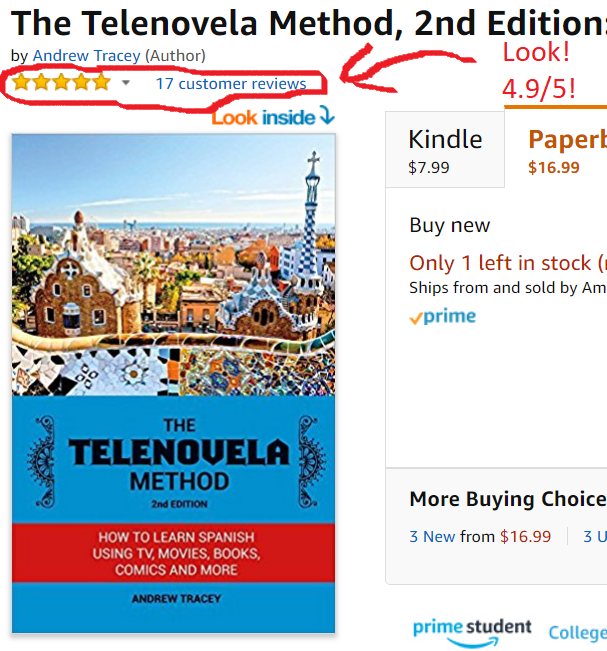
Making it fun and interesting. Period, hands-down, no contest, that’s it.
Seriously. Nothing else even comes close.
I honestly believe that this is the most important post I’ve ever written, if I could give you only one single piece of advice about learning a language and nothing else whatsoever, it would be this, this is the key, this is how you succeed, this is how you get fluent, this is what really makes the difference between people who succeed at learning a language and those who fail.
You make it fun, you make it interesting, you make it entertaining, you make it enjoyable, and you will succeed, I promise you. Why? Because you’ll keep doing it, you’ll continuously work on your language skills every
single day over a long period of time, you will be persistently consistent, the inevitable result of which is you becoming fluent in the language in question, that’s why. Simple.
Want to make fluency in the language you want to learn ‘inevitable’? And I do mean ‘inevitable’ in the literal sense of the word, as in it will happen no matter what whether you like or not if you’ll simply do this. Then do this.
It’s that simple. I didn’t say it was easy–there are many things in life which are very simple to accomplish but which are also very difficult (deadlifting 1000 pounds is an extraordinarily simple task and there are only a very few people in the world who can do it)–I said it was simple, learning any complex skill such as how to speak a new language is never easy, but it can be simple and it can be fun such that we will want to work towards accomplishing it every single day (which is precisely what’s required to accomplish it: persistent consistency), so let’s do it that way!
Why people fail
The most common reason by far that people who try to learn a language don’t, the reason that probably 90% of people who try to learn a language fail, is that they get bored and because they get bored, they quit. Their motivation simply cannot overcome their pain. What do I mean by pain? I mean anything you don’t like, that causes you to feel negative emotions (oh yeah, boredom is definitely a negative emotion, find me someone who says they love feeling bored), I mean the amount of effort they have to put forward (people hate putting forth any more effort than they absolutely have to), I mean the time they have to take to do it, the trouble they have to go to, the feeling they get of not seeing much in terms of results after putting forward what felt like a good deal of effort, I mean the feeling they have after several months of study when they realize they still can’t have a simple conversation with a native speaker. And the problem, the real problem that causes them to quit, that causes them to fail ultimately, is that the pile of pain is larger than the pile of motivation they have (imagine the two side-by-side in your head, like two mounds of dirt), and the very second that they realize that they don’t have enough of a reason to overcome that particular amount of pain, they quit.
Now, as you can imagine and have probably been told, you can always just grit your teeth and push through it: yes, you can, anyone can, but why would you? And that’s why you don’t, because you just don’t have enough of a reason to do it. If your job depends on you learning this language, then yeah you’ll learn it, you’ll grit your teeth and force yourself to pay attention in the class to do the boring, confusing, difficult homework–you have enough of a reason to (even then, why make it any harder for yourself than it has to be?), but that’s not most people who want to learn a language! Most people want to do it because they’d like to have access to a little bit bigger slice of the world, essentially, they just want to be able to communicate with people who don’t speak their language, primarily for fun (they don’t need to be able to talk to these people, they’d just like to), or they just think that learning a language would be a fun thing to do (it can be! if you do it right). If someone were holding your kids hostage and threatening to throw them off a cliff if you didn’t learn this language in 3 weeks or something, oh you damn right you could do it, and you could do it no matter how boring or dry the learning material you had to work with was. Sure. But that’s the problem, isn’t it?
You don’t have that kind of motivation, and trying to concoct it out of thin air, regardless of what people have told you, isn’t possible. So…what’s the nonsense about “making it fun”? It does two extraordinary and amazing things simultaneously: it gives you a lot of additional motivation and it eliminates a lot, almost all, of the pain. Blammo, problem solved, now you can learn the language. Done. How does it do this?
Because it makes it so that you don’t need any additional motivation related to learning the language whatsoever: if you will follow this principle, you can have a just little bit of motivation to learn the language in question and you’ll still do it. Why? Because we follow one simple criteria here, now listen up: if you would not read/watch/listen to the item in question for fun or enjoyment, were it in your native language, then don’t do it with an item in your target language. If the item in question is not something you would otherwise like to spend your time bothering with, if it were in your native language, then you don’t bother with it now when it’s in your target language (the language you want to learn). This way, you need very little additional reason, justification, or motive for taking the time and effort to bother with it now–do you need at least a little bit due to the fact that it’s going to be more difficult to decipher since it’s in a foreign language and not your native one? Yes, sure, I’m not Morpheus and this isn’t The Matrix, I can’t download this stuff into your head for you, but what we can do is increase that pile of motivation as much as possible and decrease the pile of pain as much as possible, which this does with great effect. That covers motivation, what about pain?
Solving the puzzle
It reduces pain primarily by getting rid of every single ounce of boredom you would’ve otherwise encountered had you gone with something not particularly fun or interesting (such as a textbook or formal organized lessons, whether online or from a book or class or whatever) and also by greatly reducing the effort required by making the learning process much easier: it’s a lot easier to understand what the language means and why it’s being used that way when you’ve got a real live person using it in an actual situation (e.g. a movie) where there’s context and a reason for them saying what they’re saying, than if it’s just part of some example sentence or workbook exercise with a crappy explanation you can’t understand and have to spend 20 minutes deciphering. Plus, does watching a movie or listening to a song that you enjoy really seem like work to you? I mean, at all? It doesn’t to me, even when it’s in a foreign language I can’t quite understand…you know what it seems like to me? It seems like something that I would normally enjoy with the added bonus of a puzzle, the puzzle of figuring out what they’re saying and the immense joy I get from solving the puzzle and, additionally, from learning how to solve similar puzzles in the future. The puzzle is what they said, solving it is looking up the necessary words and grammar to figure it out, and the learning is what I learned in terms of new words and how they work and are used (aka “grammar”) which will allow me to understand similar speech that uses those same words and grammar in the future. Awesome, so much fun 😀
Bonus: Not sounding like a doofus when you actually try to speak the language
You know how else this adds to your motivation pile? Because when you’re using popular contemporary media like movies and books you’re learning popular contemporary language, you’re learning the language the way that people actually use it, not the outdated or overly formal manner that you find in most textbooks and even a shocking amount of lessons in various ‘Spanish learning systems’ (Pimsleur, Rosetta Stone, etc.). Most of you are learning a language in order to be able to actually converse with native speakers and therefore this is precisely the sort of learning that you want to do and making 100% of the language you learn the sort of language that you want to learn makes for fantastic motivation for actually doing that learning.
Ok, so where should I go from here?
The first thing I’d tell you to do is read my post on The Telenovela Method (also the name of the book I’m writing–gasp! first time I’ve mentioned this on my blog) where I’ll teach you the precise method that I use to learn Spanish (can easily be applied to any other language) using movies, music videos, TV shows, books, etc. Next, a really useful resource for you would be my List of the Best Free Sites to Watch Spanish-Language TV Online, then I would probably tell you to check out some of my posts where I take a music video and dissect it and use it to teach you Spanish: the primary purpose of this is not to teach you Spanish (though the Spanish you’ll learn is a nice bonus), it’s to teach you how I do this so that you can go and do it to any song you like! I’ve done 6 such posts:
Learning Spanish from Music Videos: Shakira’s ‘La Tortura’ Dissected
Learning Spanish From Music Videos: Shakira’s ‘Suerte’
Learning Spanish from Music Videos: Shakira’s “Ojos Así”
Learning Spanish from Music Videos: Shakira’s ‘Te Aviso, Te Anuncio’
Learning Spanish from Music Videos: Juanes’ ‘Yerbatero’ Dissected
Learn Spanish from Music Videos: Shakira’s ‘Lo Hecho Está Hecho’ aka ‘Objection (Tango)’
Yes, I like Shakira.
Additionally my post on motivation is a really interesting corollary to this in that it was written like two years ago but still absolutely applies (I like the stuff I wrote about getting a girlfriend/boyfriend that speaks the language, I still say that’s the best motivator I’ve ever seen, hands down, haha). Also, let me ask you something…what could possibly be more fun than doing kids’ stuff, I mean like playing games and stupid comics and TV shows for kids and what-not? Exactly. Children’s resources and entertainment in your target language are a fantastic language-learning resource and there’s a metric shit-ton of them online for free. First, read this: Why you should use kids’ stuff: because you’re a simpleton who needs to be entertained lest you lose interest and wander off, that’s why. Next, go look at the following and find stuff that you like, pick comics (I love Garfield! and yes it’s available in Spanish!) and books that you would personally find amusing:
The Awesome Language-Learning Resource that is Children’s Books
How do I determine if something is too difficult for me or not?
This is an excellent question because if you get stuff that’s too hard for you then the effort required to deal with it could easily overpower your motivation to do so thereby resulting in you not doing it. It’s a big “demotivator”, as David calls it. David? Eh? Yeah, I was actually inspired to write this blog post by a friggin’ awesome one that David Snopek over at LinguaTrek just published today that I cannot possibly encourage you strongly enough to go and read right now: Is this book/movie/song too hard for me?
Not only am I going to let him answer this question because I’m lazy, plus I’ve already just broken 2000 words so this is plenty long enough as it is, but because, honestly, he just plain did a better job explaining it than I can, seriously. He was far more clear and concise than I could’ve been (yeah, I need to work on that, I know).
On being persistently consistent
I mentioned this in the beginning, and now I’m going to explain it as the very last thing I do, because these two words are really the key to learning a language. There is something I call “persistent consistency”, I like to say that you have to be “persistently consistent”. What I mean is that you must be consistent in your study of the language, that is studying every single day and accomplishing a minimum pre-specified (by you) amount of work (if you can call it that!), and you must be persistent about it: that means not giving up, continuing on through all the various difficulties and complications that life will inevitably throw at you. If you do this, success is inevitable. What I’m talking about is making it as easy as possible to accomplish this.
Make it fun!
I learned to speak conversational Spanish in six months using TV shows, movies, and even comics: I then wrote a book on how you can, too
I have a whole method and a book I wrote about it called The Telenovela Method where I teach you how to learn Spanish from popular media like TV shows, movies, music, books, etc. that you can all find online for free. It was the #1 new release in the Spanish Language Instruction section on Amazon for nearly a month after it came out and currently has 17 reviews there with a 4.9/5 stars average. It's available for $7.99-$9.99 for the e-book version depending on who you buy it from (Kindle version on Amazon is now $7.99) and $16.99 for the paperback (occasionally a bit cheaper, again, depending on who you buy it from).
It's currently available in both e-book and paperback from:
Cheers,
Andrew







